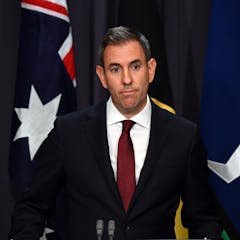
Articles on Power prices
Displaying 1 - 20 of 48 articles

In this podcast Michelle and Amanda Dunn review the year and discuss what's coming up in 2023

Australia’s governments have agreed to impose caps on the wholesale domestic price of coal and gas. How much it will help is debatable.

Energy bills are about to hurt. But what can the government actually do to ease the pain?

Michelle with Chalmers, Taylor and Wood
In this podcast, we talk to Chalmers, shadow treasurer Angus Taylor, and the head of the Grattan Institute Danielle Wood about power prices, tax pressures and spending reforms

The treasurer’s Tuesday’s appearances were his first after receiving a major rebuff when Anthony Albanese at the weekend quashed any prospect of rejigging the Stage 3 tax cuts in the budget.

The soaring power prices expected to hit Australians are yet another reason the Albanese government should turbocharge its efforts on renewable energy and storage.

Soaring costs for coal and gas point to serious issues within Australia’s electricity market, with more retail prices likely.

Australia’s wholesale electricity prices increased by 69% in the first quarter. But the competing claims about what that means are hard to decipher.

Nigeria’s attempt at privatising its power infrastructure hasn’t been without challenges but they are not insurmountable.

Australians are angry about electricity prices and both the federal government and opposition are proposing to cap them. Will this approach work, and what are the risks?

The final design of the National Energy Guarantee promises that the policy will drive down power prices. But there is precious little evidence for this assertion.

Australia’s consumer watchdog has concluded that rooftop solar incentives have distorted the market unfairly for those who cannot afford solar panels, and has recommended the scheme ends ten years early.

Energy justice is a social issue, and by leaving it up to vulnerable people to sort it out for themselves, we as a society risk making it even worse.

Scott Morrison’s budget speech held no surprises on energy, after months of debate over the National Energy Guarantee. The real news comes in July with the release of a crucial ACCC report on power prices.

You may already have a smart meter at home, which monitors your electricity use at 30-minute intervals. But until you can access that data yourself, you could be missing out on the best power deals.

Two decades ago, the then SA premier, John Olsen, defied a campaign promise and announced plans to privatise the state’s electricity industry. It’s been a high-voltage issue ever since.

The Long Read: Most Australians’ power bills have been rising for a decade. There are many reasons why, but the common thread is a lack of government willingness to get to grips with crucial policy problems.

The latest report from the Grattan Institute, finds that claims about Australia being dominated by oligopolies are overblown.

New modelling suggests that Australia could use renewable energy to hit its 2030 emissions reduction targets, without it costing any more overall than maintaining the status quo.

As federal and state energy ministers gather to discuss the Turnbull government’s proposed National Energy Guarantee, many of the finer details of the modelling are not yet available.
